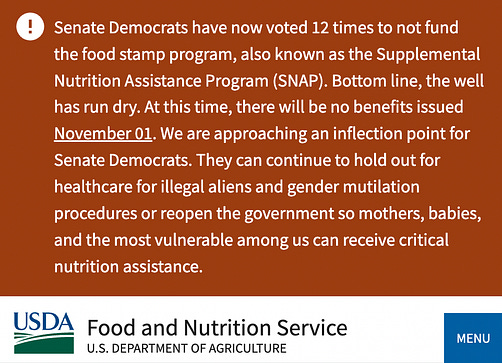|
 |
A new analysis of Washington Post editorials shows that the paper has repeatedly advocated positions that serve the financial interests of its owner, Jeff Bezos, without disclosing those conflicts. You deserve better.
Popular Information isn’t owned by a billionaire. We have no corporate overlord. We are an independent publication loyal only to our readers.
This model works thanks to the readers who choose to support it.
More than 535,000 read this newsletter, but only a small fraction are paid subscribers. If you believe in independent accountability journalism and can afford $6 a month or $50 per year, please consider becoming a paid subscriber.
The official website of the U.S. Department of Agriculture (USDA) claims that on November 1, the Supplemental Nutrition Assistance Program (SNAP) will run out of funding. The USDA asserts that Democrats are blocking funding to secure “health care for illegal immigrants” and funding for “gender mutilation procedures.”
All of these claims are false.
Around 42 million Americans — including 20 million children — rely on the SNAP program to avoid going hungry.
But “the well” has not “run dry” on SNAP. The program has a reserve of about $6 billion that could fully fund SNAP for several more weeks. The USDA’s current position is that these funds “are not legally available to cover regular benefits“ and can only be used to provide nutrition assistance in response to a national disaster or other emergency.
This, however, directly contradicts guidance that the USDA issued on September 30 which explicitly states that contingency funds can be used for regular benefits (emphasis added):
In addition, Congressional intent is evident that SNAP’s operations should continue since the program has been provided with multi-year contingency funds that can be used for State Administrative Expenses to ensure that the State can also continue operations during a Federal Government shutdown. These multi-year contingency funds are also available to fund participant benefits in the event that a lapse occurs in the middle of the fiscal year.
This guidance has been removed from the USDA website now that the Trump administration has decided that withholding the funds is politically advantageous.
But using the contingency funds to continue providing benefits is also consistent with the plain language of previous appropriations bills. The 2024 bill, for example, included the following passage (emphasis added):
For necessary expenses to carry out the Food and Nutrition Act of 2008 (7 U.S.C. 2011 et seq.), $122,382,521,000, of which $3,000,000,000, to remain available through September 30, 2026, shall be placed in reserve for use only in such amounts and at such times as may become necessary to carry out program operations
The 2025 appropriations bill contained similar language, which is why the fund now has approximately $6 billion, less any money that the Trump administration may have spent in October. This would be enough to keep the SNAP program running for an additional three weeks.
Further, Democrats are not opposed to a continuing resolution to secure health care for undocumented immigrants. They are seeking an extension of health care subsidies so that millions of Americans will not see massive increases in the cost of their health insurance. These subsidies are not available to undocumented immigrants.
The shutdown also has nothing to do with “gender mutilation procedures,” which is apparently how the Trump administration describes health care for trans people. Nothing in the Republican continuing resolution limits trans health care, and the Democrats are not seeking to expand or protect it in their counter-proposals.
A devastating impact on children, people with disabilities, and the elderly
Millions of people in the United States could experience food insecurity if SNAP is halted. Around one in eight people in the U.S. rely on SNAP benefits to afford food.
Children, people with disabilities, and the elderly disproportionately benefit from SNAP, with households with these individuals receiving “83% of SNAP benefits in fiscal year 2023.” Children made up 39% of SNAP participants in fiscal year 2023 with “SNAP serv[ing] a monthly average of 7.3 million households with children,” according to the USDA.
While some states have said that they will use state funds to provide emergency food assistance, the USDA said that states will not be reimbursed, and states cannot cover the full cost of SNAP. Twenty-five states told Politico that they would be informing SNAP participants that benefits will not be sent out next month.
Joel Berg, the CEO of Hunger Free America, told ABC News that, “If 42 million Americans and more than 260,000 retailers don’t receive $8 billion worth of grocery support in a week’s time, we are going to see the greatest hunger crisis since the Great Depression.”
Without SNAP, some Americans may have to choose between spending money on food or paying for other household expenses or even medications. Lindsay Allen, a health economist at Northwestern University told

